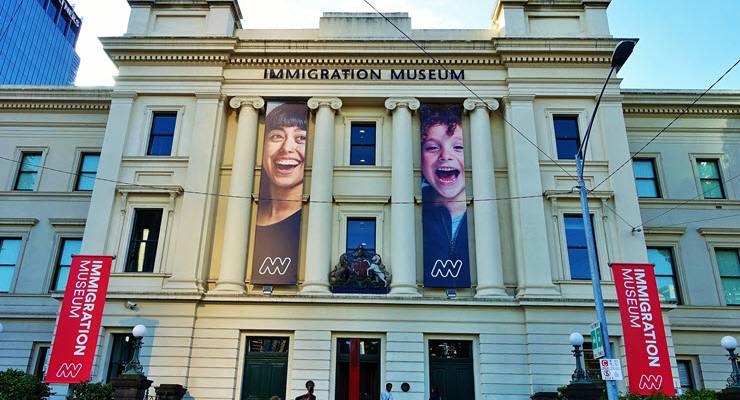
When Indian art critic and curator Geeta Kapur said “it is a commitment to see the history of art in conjunction with the history of humanity — a proposition that is humble, self-evident and audacious” it’s safe to assume that Kapur, a long-time champion for the decolonisation of institutions, wasn’t referring to a mere change of name.
For a public institution such as Melbourne’s Immigration Museum, the recent discussions about the potential name change to the “Museum of Shared Humanity” is not altogether surprising. The traditional museum model has a long history of control and order.
Museums are a colonial outpost of the finest order; one where white-Eurocentric discourse sits comfortably within the 18th century disciplinary museum model (as Gumbainggir man Professor Gary Foley argued in his essay on the evolution of museums).
As non-Indigenous settlers and immigrant writers and educators, we’re grateful to have found a home here on sovereign and unceded Kulin Nations land, even if our relationship to the land here is not the same. But the notion that we have successfully deactivated the colonial heritage of our public institutions, where history and contemporary culture is presented truthfully and critically, with all the horror of dispossession and beauty of survival, along with the heartache, joy and trauma of migration, is almost as fictional as the proposed new title.
The removal of the word “immigration” from the name of the museum, to instead include the words “shared humanity”, is enough to make you ropeable when one considers our current immigration policies. Through the removal of the word immigration, the fraught journeys of recent migrants and the longer, more jarring history of settlement is all but erased. All we are left with is a vapid “celebration” of diversity, and the expectation to continue to perform the role of the “grateful migrant” for our so-called white saviours and benefactors.
In the glory of this new “shared humanity”, the stories of the hardship of migration will no doubt be further tempered through the overarching narrative that we live in the “Lucky Country”. How we all got here and why must never be stripped from the public conversation. Indigenous history is muted again and again. Quiet now. It’s all better.
Wiradjuri man and museum educator Nathan Mudyi-Sentance has rightly argued in his blog Archival Decolonist [-o-] that museums, libraries and archives cannot not remain objective or neutral because they never were. Public institutions like museums have smoothed over a history of violent dispossession and continued cultural, spiritual and intellectual genocide of First Nations peoples. In the case of the Immigration Museum, whose humanity is this “shared humanity” being measured against?
We don’t need another museum that reifies and flattens us.
If the Immigration Museum is truly devoted to the idea of “presenting experiences that foster cross-cultural understanding and human connection”, justice in the form of Indigenous repatriation of land and life must be a priority. This process must be embedded within all layers of an organisation including hiring practices, training and funding — not just what is being presented for the public gaze.
Museums today cannot continue operations without comprehensive community consultation — least of all a name change.







So we should stick with ‘Museum of Immigration’ then?
Is this a “bring your kiddies to work” article?
Agreed – museums and galleries – all our cultural institutions – have never been neutral and the museum and gallery sector recognises the imperative to change, particularly for and with Indigenous communities, about the representation of cultures, histories, as well as changing museum operating structures, employment practices etc. That’s why the sector is adopting the game-changing First Peoples: A Roadmap for Enhancing Indigenous Engagement in Museums and Galleries which was recently launched by the national membership association in Alice Springs. It was co-developed by the sector and Indigenous communities, led by an outstanding Indigenous consultant, Terri Janke. Disclosure here – I’m the national director of the association (AMaGA) and I’m really proud of the Roadmap, the huge effort that went into the consultation and research, and the ways in which organisations around the country are responding…
Alex
Cover up all the caring so that the emerging police state can do its job without hindrance!
I’m not sure what this article is trying to say, but “Museum of Shared Humanity” makes me puke.